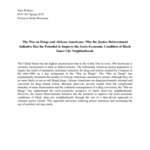The War on Drugs and African-Americans: Why the Justice Reinvestment Initiative Has the Potential to Improve the Socio-Economic Condition of Black Inner City Neighborhoods

View/
Author
Wallace, Zara A.
Subject
Washington and Lee University, Shepherd Poverty Program
Prison sentences -- U.S. states
Drug control
Discrimination in criminal justice administration
Mandatory sentences
Metadata
Show full item recordDescription
Zara A.Wallace is a member of the Class of 2015 of Washington and Lee University School of Law. Capstone; [FULL-TEXT RESTRICTED TO WASHINGTON AND LEE UNIVERSITY LOGIN] The United States has the highest incarceration rate in the world. One in every 100 Americans is currently incarcerated in state or federal prisons. The ballooning American prison population is largely the result of mandatory minimum sentences for drug convictions enacted by Congress in the mid-1980s as a key component in the “War on Drugs”. The “War on Drugs” has exponentially increased the number of African-Americans sentenced to prison. Although they are no more likely to use or sell illegal drugs, African-Americans are disproportionately arrested and convicted for drug related crimes. Because inner-city poverty results from the complicated interplay of mass incarceration and the collateral consequences of a drug conviction, the “War on Drugs” has undermined the socio-economic prospects of black inner-city neighborhoods. However, the Justice Reinvestment Initiative has the potential to improve the socio-economic conditions of black inner-city neighborhoods through the use of a data-driven approach to criminal justice reform. This approach advocates reducing prison sentences and increasing the use of problem solving courts.